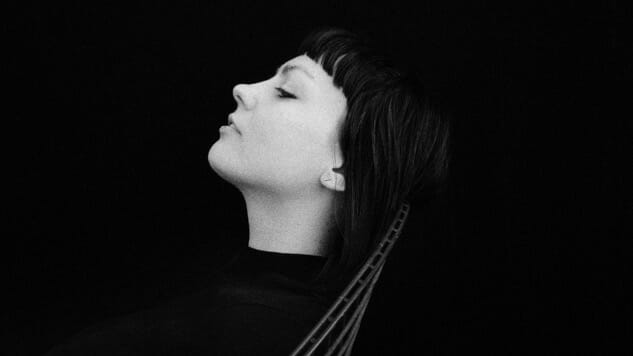Catching Up With: Angel Olsen

Waylon Jennings once boasted that he “couldn’t go pop with a mouthful of firecrackers,” a statement that said as much about how country artists regarded pop music as it did his lack of mainstream commercial appeal. The years have done much to erode the distinctions between genres, but some of those who came up through the DIY trenches can be forgiven for still harboring a little remaining “us versus them” tension. Angel Olsen is one such artist, having cut her teeth in her native St. Louis punk scene before moving to Chicago in the mid-2000s to reinvent herself with some haunted lo-fi tracks whose tape hiss was nearly as loud as the music. A career as a pop singer did not appear to be in her future.
Five years later, Olsen might not be dominating Top 40 radio, but there are few singer/songwriters who are better positioned to expand their cult beyond the NPR/New Yorker/Pitchfork bubble and into the living rooms of suburban America. The potential for such an expansion was obvious from the first echo-drenched vocals of “Intern,” the synthy first track from My Woman, her widely acclaimed third full-length release. Though Olsen quickly pivots on the album from those airy, electronic tones to explore more familiarly glammy, grungy and jangly textures, the impression sticks. This is an artist going widescreen.
At her adopted home in North Carolina following the first leg of touring with her band, Olsen appears eager to take the next step in her creative reinvention. The writing and recording of My Woman has left her with an expanded studio vocabulary and a creative toolkit bursting at the seams with new toys (effects pedals, synths). Get her talking about the minutia of mixing and mastering, and she doesn’t want to talk about anything else. There are stories Olsen doesn’t want to tell anymore—how she was adopted, how she grew up the youngest of eight children in a conservative Christian household, how she toured as a member of Bonnie “Prince” Billy’s backing band before she found success as a solo artist—and there is little reason to bring them up. The story she’s writing now is more interesting than any of her earlier chapters.
Paste: It seems like your music is all over the place right now. I see your album mentioned everywhere. Does it feel that way to you?
Angel Olsen: Hmm…slightly but not really. I know that I’ve made decisions to put my face on advertisements and stuff to promote the shit out of it, because I care a lot about it and I care a lot about the band that was with me making it. So I had to stomach a little bit of selling my thing, selling my sound to people and promoting it. I’m from this background that it felt uncomfortable for me to get used to it, at first. I didn’t do stuff like that for the last record. It was more like a test for me. If I just get the information out there, is that so terrible? So there were definitely decisions that I made to promote it that are different, that are affecting it and affecting the audience a little bit more.
Paste: Did you expect this kind of reaction?
Olsen: I didn’t really think that making a synth song was going to be this big statement that everyone thinks it is. The last thing I wanted was for my audience to be like, “You’re becoming something that you’ve never been. You’re not yourself anymore,” when I feel like I’m doing things that are within myself and within my writing. It’s just that I’ve changed as a person, and I’ve changed my aesthetic a lot. People are calling it a pop record, which I’ve never really thought of my work as pop. I don’t think of this record as a pop record, mostly because when I hear the word “pop,” I think they’re taking about the production style. But the production style is really raw in my opinion. The way I mixed it with Collin [Dupuis], we were recording on tape, and there are mistakes in that. You listen to a lot of records these days, and everything sounds super warm and “perfect for your listening experience.” I didn’t feel that way about mixing this record, necessarily, but I’m happy with it. I just didn’t think it was the product of a pop record. There’s stuff like that that throws me off a little bit, but I wonder if this thing that I feel is misleading is actually helping me promote my record. It’s a little weird.
Paste: So what do you think people are hearing that is making them think this is a pop record?
Olsen: I think they’re only hearing the first song.
-

-

-

-

-

-

-

-

-

-

-

-

-

-

-

-

-

-

-

-

-

-

-

-

-

-

-

-

-

-

-

-

-

-

-

-

-

-

-

-








































